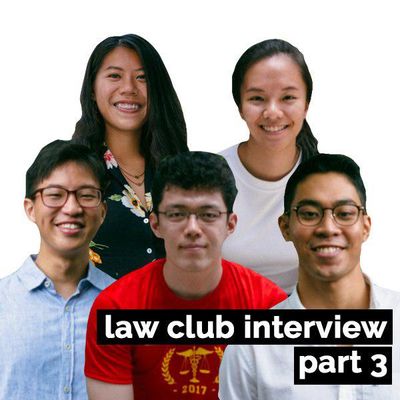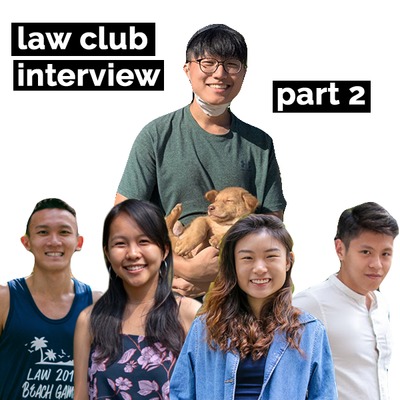[Due to the sensitivity of the topic — audience members have asked not to be named. Similarly, speakers will not be named]
On the 14th of October, the Mooting and Debating Club held the inaugural ‘Quadversations’, a local spin on Oxford Union debates here in the leafy glades of BTC — in the slightly less leafy glades of the Moot Court to be exact.
The topic for the day was ‘Law school has no confidence in a one-party state in Singapore’. The debaters were fiercely intense Year 1s eager to prove their mettle.
Associate Professor El Wong was kind enough to grace us with her presence, as well as provide us with extremely quotable quotes on her thoughts regarding the event.
“It’s great — I’m fully in favour of any alcohol loosened discussions on matters of current importance”, Prof Wong said, beer in hand, jauntily leaning against her chair.
“On a more serious note, my ambition is to see the law students of this school be appreciated not just for their proven academic professional ability, but also as future leaders, their thoughts and insights about what is happening in Singapore politics.”
I was fortunate enough to be seated behind the esteemed Prof Wong (who had recently penned an article reflecting on the outcome of GE2015) and a fellow Year 2, both of whom kept up a lively discourse on the mathematical analysis of percentage points by which the mean approval rate for the PAP had been slipping over the years — I nodded along and attempted to make intelligent sounds where I could, feeling enlightened simply being in their presence.
The majority of the more salient and interesting points have been reproduced here for those who were unable to make it on the day itself — not exactly the most riveting stuff but certainly better than studying.
The debate itself began lively enough, with speakers claiming they would not engage in PAP bashing, no doubt to the disappointment of many.
The first speaker wound up his point by claiming the single party state was too obsessed with its own ideology — basically, the crime of political naval-gazing.
The discussion was then opened to the floor – where due to the lack of opinion by everyone other than Prof Wong – Ian, the attractively deep-voiced moderator, took over and questioned the proposition as the quality of the democratic mandate given by the people to the ruling party.
The proposition did put up an impassioned response however, noting that just because Singaporeans voted for the incumbent, this was not itself indicative of them fully agreeing with their views.
Proposition then forged ahead by tangentially blaming the one-party state for creating a “sanitized, manufactured culture”.
As the audience began to warm up (no doubt thanks to the effect of alcohol and MSG), P asked how exactly this situation would change in a two party system. In fact, P continued, would there not be deadlock and inefficiency? After all, a two-party system was not a Magic Bullet.
The opposition team capitalized in on the silence that followed with a “Hear hear” — all good debaters know how to get the most credit by doing the least work.
F additionally cut in to ask how an echo chamber would not develop in a two-party system — that this was likely to create a merely reactionary opposition.
This sudden onslaught of audience participation clearly took the opposition by surprise and they spent some time conferring while everyone else sat around awkwardly.
Opp’s response was to cleverly evade the argument altogether by first assuming F had referred to the US and then distinguishing it as an exceptional political culture.
The debate began to degenerate into more a Q&A that made me feel uninvolved, uninterested and also hungry for nuggets. At this point, Ian asked me if I caught something and I immediately felt guilty for thinking about nuggets.
The next proposition speaker who took the floor was a natural born crowd pleaser — I know this because he mentioned internet memes and used lots of terrible puns.
The thrust of their case was that the one party system was better in the Singaporean context — that since Singapore was a parliamentary democracy and people had voted in a single party and there was no reason from voting them out.
Like any good debater he had a road map which I diligently noted and reproduced here for your benefit:
- One party systems avoid gridlock that adversarial systems face — this is a necessity to ensure Singapore’s survival..
- The talent pool is too small to be divided into two parties — talent should be concentrated in one party
Prof Wong then asked an astute question on why in a two party system the existing government would not then have the opportunity for their talent to flourish.
Not one to back down, the speaker met Prof Wong’s challenge head on and asserted that the incumbent would have an incentive to discredit the party not in power.
There was then a heated exchange about which kind of party system incentivized discreditation occurring in the first place — it was legitimately interesting and heated and one of the most enjoyable parts of the debate. I completely forgot to write anything about it but it was just one of those things that you had to be there to enjoy.
Proposition pushed an argument in multi-party systems there was less of an incentive to open books because of the political insecurity of each party.
This was roundly rebuffed by Prof Wong who demolished and inverted it by asking why a party that knew their opponents would shortly be sitting in the same chair and have access to those same files would have less of an incentive to open such books.
There was then a guest appearance from Prof Tan, who commented that the bureaucracy in a multi-party state was more likely to be less transparent than that in a single party state, although it may be reversed at the higher levels of leadership.
The next proposition speaker was really good. In particular, her arguments on how multi-party states provide incentives for checks and balances that work on both parties but which are disregarded in single party states which have an incentive to game the system which drew approving nods from Prof Wong — certainly a happy memory for her in time to come.
There was then another interesting and fascinating discussion on how press freedom laws correlated to strong multi-party state parties — which similarly was too interesting for me to keep track of.
The final opposition speaker opened with what was obviously a rehearsed anecdote that made multiple references to Year 1 Contract Law, which no doubt went down well with the freshie bloc next to me but just gave me near fatal flashbacks.
The ultimate baseline opposition put forth was that a one-party system is necessity of ensuring political and economic stability.
There was a briefly engaging tussle as F and I tag-teamed the speaker on the issue of social instability — in particular how there would be even more entrenched divisions within a two-party system and social instability.
Ian then leapt to his defence — that at the end of the day, opposition candidates at present were simply not good enough.
The debate ended with a warm heady buzz in the air — partly fatigue from the intense back-and-forth, partly from the door that had been left open by curious bystanders who had heard there was beer.
In conclusion, the inaugural sessions of Quadversations gets a solid 6 — a good way to spend an afternoon not doing much in school before the exams without feeling too guilty about it.
Written by: David Aw (Year 2)





